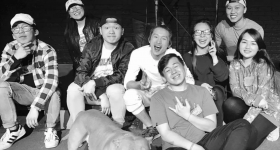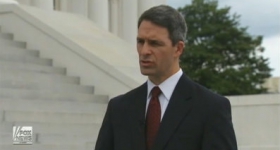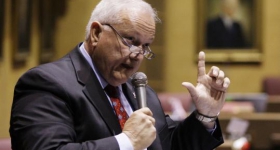Yuri Kochiyama painting by Sahra Vang Nguyen.
One of my favorite stories about Yuri is also about Tupac. In an event curated by the late Fred Ho in celebration of Diane Fujino’s 2005 book release of the biography Heartbeat of Struggle: The Revolutionary Life of Yuri Kochiyama, Laura Whitehorn spoke of the activist harbor that was the Kochiyama house. Dubbed “Grand Central Station” or the “Revolutionary Salon,” this Harlem apartment and Kochiyama family residence was a hub for activists, artists, students and other community members for much of the last four decades of the 20th century. Whitehorn recalled a then 9-year-old Tupac Shakur speaking eloquently and passionately about the need to free political prisoners at a meeting in Yuri’s house. This 9-year-old Tupac was, of course, not just talking about abstract historical figures, but members of his own family -- his stepfather Mutulu Shakur, his godfather Geronimo Pratt, Sundiata Acoli, Sekou Odinga, and others.
That image of Pac as a child speaking about the struggle to free his politically imprisoned family members at Yuri’s house was something very moving to me. It spoke of the insurmountable courage of Pac’s childhood, and it spoke of the prodigious compassion of Yuri and the Kochiyamas to continually share their space. It also embodied the interconnectedness of our struggles. Because if a Japanese American woman such as Yuri and Malcolm X were a hard pairing for people to imagine, then undoubtedly in public imagination Yuri and THUG LIFE are too; and what people don’t understand about Yuri reveals exactly how much we don’t understand about social movements.
Yuri and Pac’s families were profound friends, comrades in intense post-Malcolm struggles for Black and Third World Liberation. Trace the lineages, and one can see how the legacies of both families and their communities catalyzed movements that transformed the nation and world twice over. Whitehorn’s snapshot of Yuri and Pac was like listening to “Free the Land” by Chris Iijima, Nobuko Miyamoto, and Charlie Chin on the A Grain of Sand album. Pac’s stepfather Mutulu Shakur is literally singing there with them on that record, and they are collectively singing the ethos of Malcolm’s call for the self-determination of all oppressed people.
Whitehorn’s brief story here also illustrated how these are struggles political and personal. Pac often talked about how Movement radicalism left women like his own mother raising families on their own while the men in the family were incarcerated, assassinated or absent. Pac’s politicization as a child was parallel to the immense trauma and loss he must have felt as a child of war under siege by the FBI’s COINTELPRO. This is not unlike Yuri’s own experiences during World War II, how just prior to her family’s forced removal to a concentration camp, her own father, a leader in the Japanese American community in San Pedro, CA, was illegally detained, interrogated and denied medical care by the FBI for six weeks and died the day after he was released.
Yuri and Pac both turned their pain into power.
Through the usage of informants and anonymous letters, COINTELPRO FBI agents created friction in the Movement through fiction. Yuri, however, never wavered. She was “the person,” as Angela Davis described in tribute, “who can really change the world.” “This is the person we all need to emulate. We need to emulate her because she knows that the most important work is in the details, in the small things, in the letters, in the words exchanged between us, in the smiles, in the love.” Yuri combated polarization with inclusiveness. She was the safe space. Yuri’s ability to sustain positive relationships amongst Movement activists across generations must be seen as resistance against oppression in the highest of forms. Indeed, she was her own rose that grew from concrete -- or concentration camp. And best of all, she planted and helped blossom many, many more.
As we continue to memorialize Yuri, it is vital to not see her as a flash in the pan, but water in a neverending river for justice. For the next generations especially, to connect the dots between Kendrick Lamar, Pac, Malcolm and Yuri. She herself would have made the transnational political connections occurring in today’s world from Gaza to Ferguson, generationally between Emmett Till to Mike Brown, Vincent Chin to Renisha McBride; Mumia to Snowden; White supremacy and imperialism to neoliberalism.
The spirit of Yuri is in our interconnectedness. Yuri Kochiyama, eternally, presente.
UPCOMING MEMORIALS FOR YURI KOCHIYAMA:
LOS ANGELES
August 31, 2014 (Sunday)
2:00 - 4:30 pm
Aratani/ Japan America Theatre
244 South San Pedro Street (bet. 2nd & 3rd Sts.)
Los Angeles, CA 90012
NEW YORK
September 27, 2014 (Saturday)
5:00 - 7:30 pm
First Corinthian Baptist Church
1912 Adam C. Powell Boulevard
New York, NY 10026
***
Taiyo Na is musician, writer, and educator from New York City. When he was an awkward 19-year-old, Yuri generously remarked with a smile how his poetry was “firebrand.”









Comments